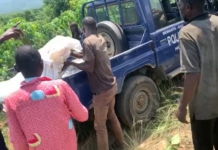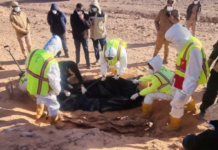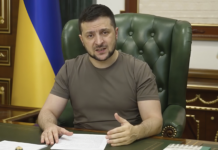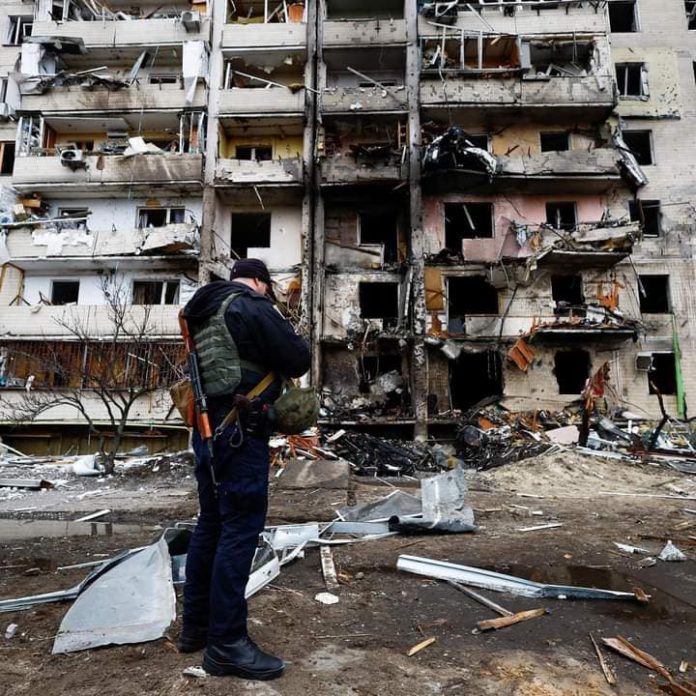
On the white, damp wall of the Yahidne school basement is a crude calendar, drawn in red crayon. It marks a period of unimaginable trauma – from 5 March to 2 April – for the people of this village.
Yahidne, 140km (80 miles) north-west of Kyiv and just outside the city of Chernihiv which is close to the borders with Belarus and Russia, was occupied by Russian soldiers for nearly a month.
When they entered, they took men, women and children from their homes at gunpoint and held them in the basement of the local school for four weeks – around 130 people cramped into a room roughly 65 sq m (700 sq ft) in size.
Sixty-year-old Mykola Klymchuk was one of them. He offered to show us the basement.
As we climbed down a short flight of stairs, we began to smell the stench of disease and decay. The room was dirty – some mattresses, clothes, shoes and books were strewn on the floor, there were four small cots in the centre and a stash of utensils in one corner.
Mykola took us straight to the far end of the room.
“This was my half a metre of space. I was sleeping standing up,” he said. His voice choked up and he started crying. “I tied myself to the railing here with my scarf so I wouldn’t fall over. I spent 25 nights like this.”
Mykola said you couldn’t move at all for fear of stepping on people. About 40 or 50 children were among those held captive, including babies. The youngest was just two months old.
Russian forces were quick to reach villages such as Yahidne as they launched their assault on Chernihiv. For weeks the city of about 300,000 people was cut off as Russian forces surrounded and bombed it, having met resistance. They also destroyed a bridge on the road to the capital Kyiv, leaving residents with nowhere to flee.
Now the Russians have withdrawn following their failure to take Kyiv. The BBC is one of the first news organisations to reach the area and the horror of what happened under both occupation and bombardment can be revealed. So close to the border, people worry too that the Russians could soon return.
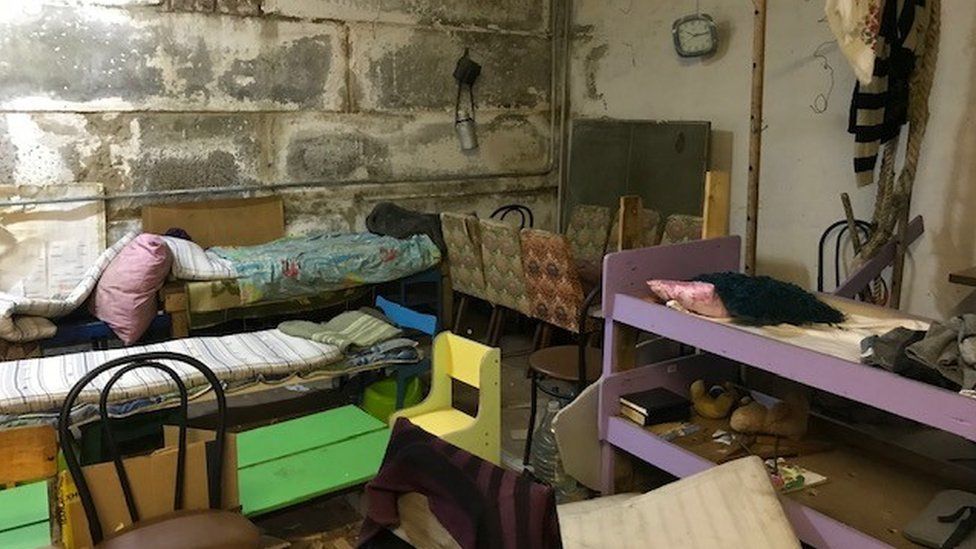
Fifteen-year-old Anastasiia was in the Yahidne basement along with her father and grandmother.
“There was barely any room. We were living sitting up. We were sleeping sitting up. Not that we slept at all. It was impossible. So many shells were landing around here. It was unbearable,” she said.
The room had no ventilation. Its two windows were boarded up.
“During my time here, 12 people died,” Mykola said.
Living with the dead
Most of them were elderly people. It’s unclear what they died of, but Mykola believes some suffocated to death.
When people died, the bodies couldn’t immediately be removed. Russian soldiers would not allow it every day. And because of the constant fighting outside – mortar shelling, explosions and gunfire – it was dangerous as well.
This meant that people, including children, lived amidst corpses for hours, and sometimes days, until they could be taken outside.
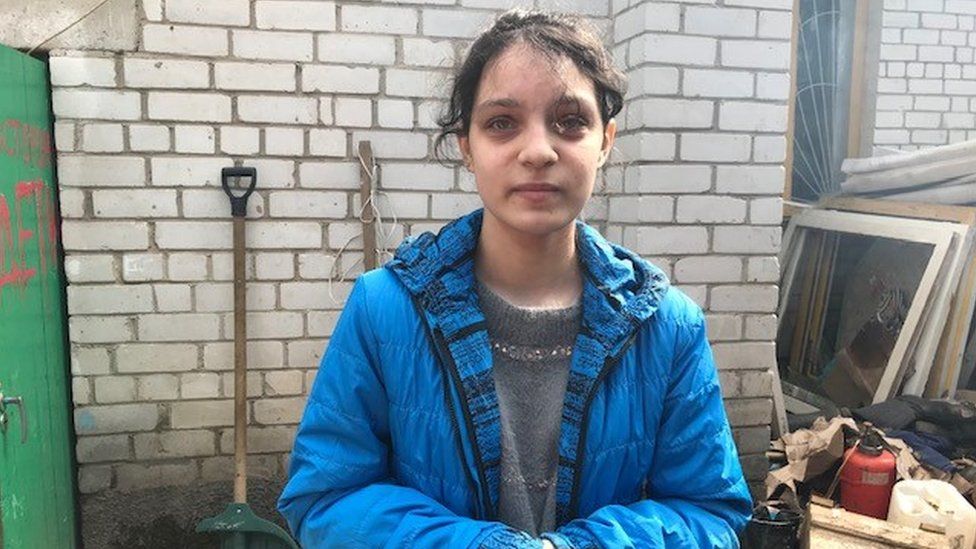
“It was very scary. I knew the people who died,” says Anastasiia. “They treated us very kindly. I felt so sad, they just died here for no reason.”
“In normal conditions, they would not have died. Putin is a war criminal,” said Mykola.
“My feet had begun to swell up. But I kept thinking to myself, I have to survive. I have to, for my daughter and two granddaughters.”
Most of the time people were not allowed to go out even to use a toilet. They were made to use buckets instead.
“Sometimes the soldiers took people out to use them as shields,” Mykola said.
They were allowed to cook on open fires outside twice a day. The village had enough food stocks and a well for water.
One of the Russian soldiers told Mykola they had been told they would be in Ukraine for just four days, which would be enough to take over Kyiv.
Looking for loved ones – in graves
On 3 April, the Russians withdrew from Yahidne.
Ukrainian soldiers are now in the village, and most of those who were trapped have been evacuated to areas nearby.
“I wake up many times every night. I feel like I can hear the sound of shooting. I run to my parents, scared,” says Anastasiia.
The Russians occupied villages like Yahidne around Chernihiv in a bid to lay siege to the city and eventually take control of it.
They weren’t able to enter the city, but there’s been extensive destruction to many parts of it and officials say around 350 civilians have been killed.
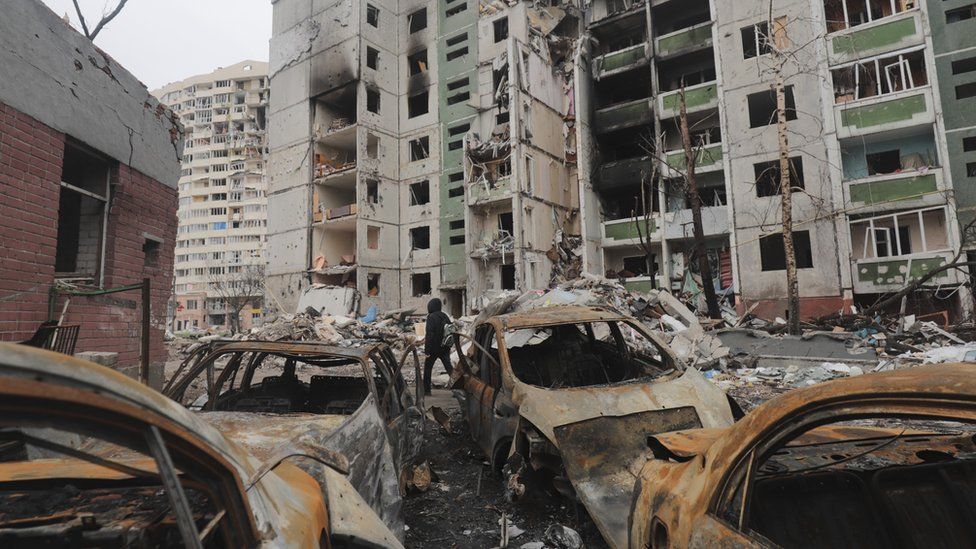
Since Russia’s withdrawal from around Chernihiv, volunteers have been burying the dead. One part of the local graveyard is now entirely full of fresh graves, with a placard stuck in each, for the purpose of identification.
Families who have been separated have been coming to see if they can find the grave of their loved ones.
A local football stadium was bombed, Ukrainian officials say by Russian aircraft. A giant crater can be seen in the centre of the field where one bomb fell. Another destroyed a part of the stands, now a mangled mess of broken plastic seats and metal railings.
Next to the stadium, a children’s library housed in a historic building has also been badly damaged.
As we drove through the city, we passed several residential neighbourhoods which have been almost flattened.
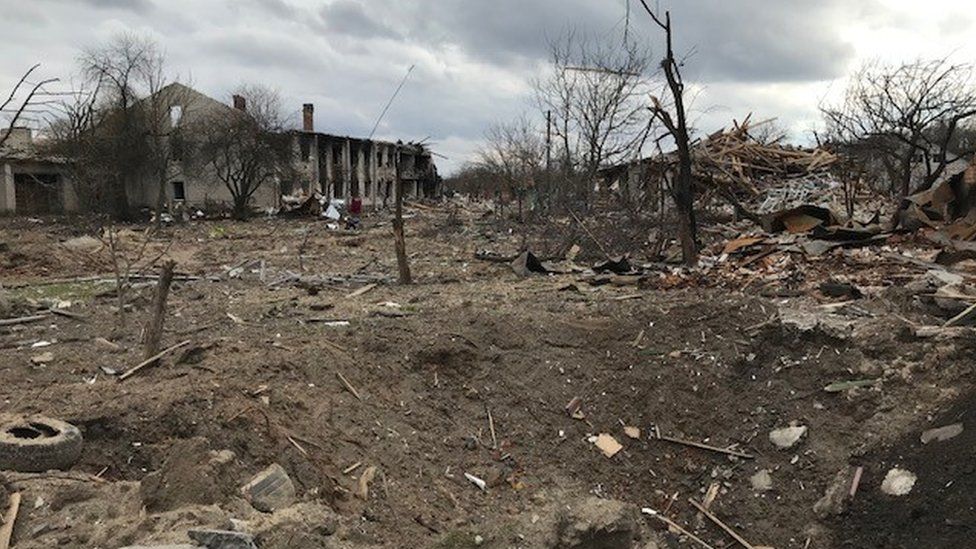
At Novoselivka, in the north of Chernihiv, destruction is visible as far as the eye can see.
Piles of stones and bricks lie where homes must have stood. We saw a child’s pink winter jacket, a teddy bear, a stuffed elephant and pieces of Lego on one of the paths going into the residential area.
Along the way, we saw more bomb craters.
‘Why were we not warned?’
A woman and child on bicycles gestured to us to follow them.
Sixty-two-year-old Nina Vynnyk and her grandson, 10-year-old Danylo, wanted to show us their home – only a shell now, everything in and around it has been destroyed.
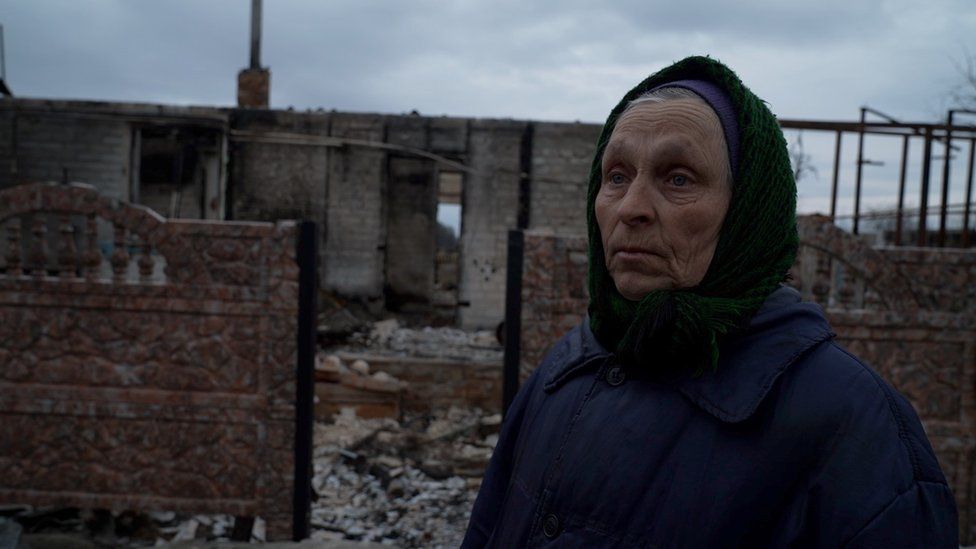
Nina’s daughter and Danylo’s mother, 39-year-old Ludmyla, has lost her leg and is in hospital.
When Nina’s home began to be shelled, they ran to another person’s house hoping to seek shelter in their basement. But that was bombed too.
“We were knocked out by the explosion. Someone got a concussion, someone was injured. When we came to our senses, I saw that my daughter was screaming, ‘Mummy, mummy I don’t have a leg’. It was horrible,” she said.
Ludmyla crawled to safety and was taken to a hospital.
“I feel like this is a terrible nightmare. It can’t be true. Why didn’t our government warn us? Why didn’t they evacuate us,” said Nina.
Four generations of her family lived in the home. “In one moment, there is nothing left. I don’t know where I will live in the winter,” she said.
She can’t afford to pay for prosthetics for her daughter.
On Russian statements that they have not targeted civilians, she says, “He [Putin] is full of lies. There is a woman in a hospital without a leg. That is the truth.
“Let Putin pay for her surgery. Let Putin build this house. He wanted it so much, didn’t he? Let him pay for all of it now.”

